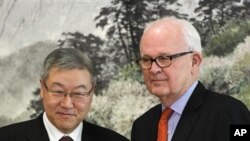U.S. diplomats, intelligence officers and other officials have rushed to Asia for consultations following North Korea's claim to have secretly constructed a uranium enrichment facility. Among the South Korean responses under discussion: bringing American nuclear weapons back into the country.
Provocative program
After his meeting at the South Korean foreign ministry on Monday, the U.S. special envoy for North Korea, Stephen Bosworth, said "this is not a crisis."
But he added Pyongyang's new uranium enrichment program is provocative.
"This is clearly a violation of U.N. Security Council Resolution 1874. It is a violation of North Korea's commitments under the September 2005 joint statement. And it's a violation of other commitments that they have made to us and other partners in the six-party process," Bosworth said.
American scientists, who visited North Korea this month, say they were shown more than 1,000 new centrifuges for processing uranium.
Nuclear re-deployment
Among the reactions here: Defense Minister Kim Tae-young said South Korea would consider redeploying U.S. tactical nuclear weapons on its soil.
Kim made the remark in response during a parliament committee meeting. He said the issue could be raised during a meeting next month of a U.S.-South Korean military committee devoted to deterring North Korea's nuclear programs.
The U.S. withdrew nuclear weapons from South Korea in 1991, and a Defense Ministry spokesman says that until now, South Korea had not considered reintroducing them.
Talks under way
The U.S delegation has gone to Tokyo for discussions with Japanese officials and later will hold talks in Beijing.
The Japanese government calls North Korea's claimed uranium enrichment "absolutely unacceptable."
China has been trying to revive six-nation talks on ending North Korea's nuclear programs, which began in 2003. Pyongyang agreed to shutter its nuclear facilities in exchange for fuel aid and a commitment by Washington and Tokyo to discuss establishing diplomatic relations. But the North pulled out of the talks two years ago after the United Nations condemned its launch of a satellite.
Discovery during visit
Three experts from Stanford University, in the U.S. state of California, visited North Korea's Yongbyon nuclear site on November 12.
Former U.S. intelligence analyst Robert Carlin says he and his colleagues were shown the facility and told it is already producing low-grade enriched uranium.
"If it is, then the North Koreans are much more technologically capable, their [nuclear] industry is operating at a higher level than people imagine," he said.
Carlin said he doubts the North Koreans mastered the technology without outside help.
"It's quite possible, and maybe even likely, that they got some sort of external assistance and very likely candidates are either Iran or Pakistan," he said.
U.S. Defense Secretary Robert Gates says the technology would allow Pyongyang to increase the number of nuclear weapons beyond the few it is presumed to have.





